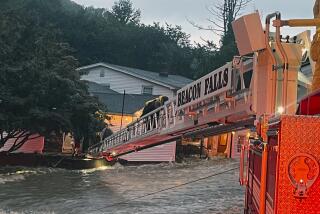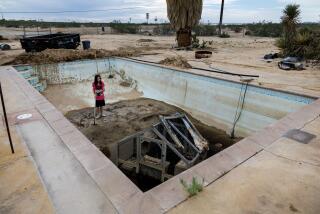In flood-damaged Colorado, a race against winter
- Share via
LYONS, Colo. — Six weeks after floods ravaged Colorado, this small town at the foot of the snow-covered Rockies was still without utilities, with 20% of homes damaged, most businesses shuttered and all roads in closed to the general public.
One of the few businesses that reopened was St. Vrain Market, Deli & Bakery, named after the nearby creek that overflowed its banks. Still, prospects are dim: 80% of inventory lost, staff reduced from 16 to four. And no flood insurance.
“We can get back up to operations, but what do you do if you don’t have the traffic, people coming through to Estes Park, which is significant, even in the off season,” said one of the owners, Connie Sullivan, 44.
Estes Park, about 20 miles northwest in a valley near Rocky Mountain National Park, is a draw for tourists across the Front Range that benefits the rest of the region. Lyons will depend on it to recover.
The Diamond Shamrock gas station in Lyons was one of the busiest in the state, driven in part by Estes Park traffic — 35,000 cars a day at peak season, said Rick England, a surveyor and part owner of Spirit Hound Distillers next door. The distillery lost some of that business, and its flood insurance only covered the building, so it lost about $130,000, he said.
England, 53, who has lived in Lyons for 20 years, drove around town last week pointing ruefully to washed-out bridges, flooded streets and closed businesses: the Black Bear Inn, Barking Dog Cafe and Red Canyon Art Company.
“We depend on Estes,” he said.
The floods that started during the second week of September damaged or destroyed 26,000 structures statewide, according to Micki Trost, a spokeswoman for the Colorado Office of Emergency Management.
Flood-damaged state roads will require $450 million in repairs, including the main highways into Estes Park and Lyons, and the state will be reimbursed by the Federal Highway Administration, said Colorado Department of Transportation spokeswoman Amy Ford.
“They likely will be paved in both directions, but they won’t be what people are used to — there may be gravel in some places, the guard rails and the barriers may be more temporary. Going forward we will look for more permanent repairs, but the important piece is they will be safe and passable for winter,” Ford said.
Although other parts of Colorado see a winter boom in tourism, this area near Rocky Mountain National Park sees more visitors in summer and fall. Many businesses in both towns lost fall traffic because of flooding and have been forced to close temporarily while they make repairs in anticipation of a summer boom — if tourists return.
“The challenge for us is we were an emerging town — we’re small, unlike the Jersey shore” after Superstorm Sandy, Sullivan said.
Access to Lyons, a town many tourists pass through on their way to Estes Park, has been limited to its 2,000 residents, local workers, insurance adjusters and those making repairs.
Signs on one road into town warned “Highway 7 and 36 Lyons to Estes Park closed” near a pile of cracked concrete and “No access to Estes Park” as National Guard crews patched holes and filled roadsides devoured by rushing floodwater.
At a town disaster meeting Thursday night that drew more than 700 people, the mayor said that scores of drivers headed to Estes Park had been turned away from a sheriff’s checkpoint on the one road leading into Lyons.
The governor’s office announced earlier in the week that 77% of flood-damaged roads had reopened, with the rest scheduled to be repaired by Dec. 1. Officials plan to reopen Highway 36 by mid-November.
One major road into Estes Park reopened this month: Highway 119 through Boulder Canyon.
But taking the scenic “Peak to Peak” route on Highway 119 through the mountains is still perilous, with lanes closed in places as crews make repairs. Because it takes an added hour to drive that way from some nearby cities, business owners fear it may deter day trippers.
If shorter routes into Estes Park don’t open before winter, crews may not be able to make the required $2 million in fixes it will take for the 36-room and 11-cabin Aspen Lodge Resort & Spa to reopen by summer, owner Yun Xiang Tseng said.
“For Estes Park, it’s really a challenge because as soon as November comes, the ground freezes and you can’t make repairs,” said Tseng, 46, who had to let go of 23 staff members, cancel events and apply for a Small Business Administration loan to cover costs.
Estes Park is home to nearly 6,000 people, making it about three times as big as Lyons, and about half its structures were damaged by flooding, a town spokeswoman said. Elk Fest at the end of September saw smaller crowds than usual, and it’s unclear whether the annual Christmas parade will draw the usual 20,000 people.
“Everybody’s hoping roads will be passable and that can come off again,” said Steve Mares, 64, a carpenter still without sewer service last week. “For some businesses, it will be a question of whether they can make it though the winter.”
Downtown businesses along the Big Thompson River that flooded were still closed for repairs last week, including Kind Coffee, Rocky Mountain Gifts & Tobacco and Poppy’s Pizza & Grill.
Poppy’s owner Julie Pieper, 47, and her husband combined the menu and remaining staff with their other nearby restaurant, Mama Rose’s, while they make repairs. A sign outside read, “We are coming back as fast as we can!” They hoped to have a busy enough winter to keep their staff, which has already been halved because some people were unable to commute from places like Lyons.
“The two towns are very close — a lot of people live down there and work up here and vice versa,” she said.
The first light snow came the week before, with some lingering in the hills as people rushed to make repairs. In Lyons, England stopped to talk to the mayor at a temporary town hall and disaster center in the local elementary school, vacant since the flooding, when classes moved to a nearby city.
“Our plea is going to be, ‘Save small-town America.’ It takes people coming here and spending money. I’m just worried it’s not going to be enough,” said Mayor Julie Van Domelen, a former economist with the World Bank. “We are the quintessential small town. That can die without support.”
More to Read
Sign up for Essential California
The most important California stories and recommendations in your inbox every morning.
You may occasionally receive promotional content from the Los Angeles Times.











